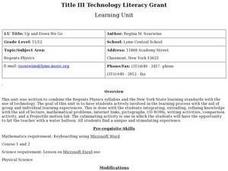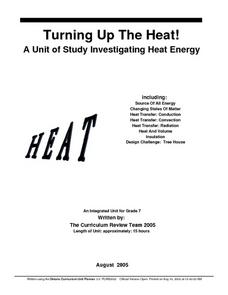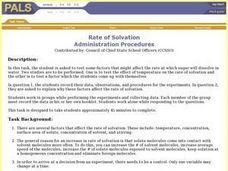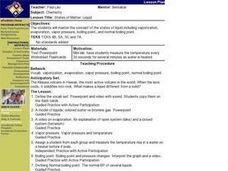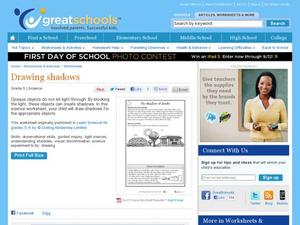Curated OER
Up and Down We Go
Students explore physics concepts such as velocity, acceleration and speed to create a model of a safe roller coaster. They design and conduct a lab to demonstrate the properties of an object fired horizontally and at an angle.
Curated OER
Exploring Limu Diversity
Students explore limu diversity. In this ocean ecosystem lesson, students classify limu according to its physical properties. Students work in small groups to generate scientific observations and sort limu by characteristics.
Curated OER
Turning Up The Heat!
Young scholars investigate the properties of heat. They explore methods of temperature control and measurement. Through experimentation and activities, students design a high tech tree house. They consider electrical, solar, and natural...
Curated OER
Flipping Coins: Density as a Characteristic Property
Young scholars explore linear functions in a crime solving context. They collect and analyze data using linear equations, then interpret the slope and intercepts from a linear model.
Curated OER
Science-Introduction to the Unit on Matter
First graders gain knowledge about solids, liquids and gases by taking a look at the things around them. They have to classify certain picture cards based on which category they feel the picture falls under. As a whole, the class...
Curated OER
You Light Up My Life: Developing a Scientific Theory for What Fuels a Candle's Flame!
Students examine how candles work and how scientific theories are developed and tested. Students propose hypotheses about what is burning in a candle then perform tests in order to develop their scientific theory. After a teacher...
Curated OER
Chemistry Practice
In this chemistry practice worksheet, students select the correct response to the given questions. Students apply knowledge about the states of matter, finding vapor pressure and atmospheric pressure.
Curated OER
Frozen Solids
Students investigate various properties of ice including melting points and the effect of pressure on ice. They demonstrate how increased pressure lowers the melting point of ice and perform a simple experiment proving that water is more...
Curated OER
Paper Chromatography
Students use this design the illustrate how ink can be separated into its component chemicals using paper chromatography. They use five unknown samples of ink on pre-labeled chromatography strips are provided to students. Students use...
Curated OER
Chemical Changes
Eighth graders observe two types of interactions in a sealed plastic bag. One bag contains baking soda and water, and the other baking soda and vinegar. They determine what evidence indicates that a chemical change is occurring.
Curated OER
A Model of a Scanning Tunneling Microscope
Ninth graders explain how a scanning tunneling microscope works. In this chemistry lesson, 9th graders construct atomic models and simulate how their images appear under the STM. They discuss the limitations of their atomic model.
Curated OER
Temperature and Enzymes
Young scholars compare the times it takes the milk in each of two cups to curdle. They are told that an enzyme that is added to the milk, rennin, is involved in the natural curdling process of milk. Students are asked to consider what...
Curated OER
5th Foss M&s Word Search Puzzle
In this properties and characteristics of substance activity, students review and study six key terms associated with matter and then locate those six terms in a word search puzzle.
Curated OER
Rate of Solvation
Pupils test factors that may affect the rate at which sugar dissolve in water. They conduct two studies: One is to test the effect of temperature on the rate of solvation and the other is to test a factor which Students come up with...
Curated OER
Matter and Chemical Bonding
In this chemical bonding worksheet, learners read about the invisible killer, dihydrogen monoxide. Students read about the products it is used in and the problems it causes to the environment. Then learners complete 19 short answer...
Curated OER
States of Matter: Liquid
Students work in a mini lab where they measure the temperature every 30 seconds for several minutes as water is heated. They are asked what makes liquid different from a solid. Students view a PowerPoint on the model of liquids,...
Curated OER
SAFETY KNOWLEDGE BASE CHANGES
Students research and formulate a hypothesis for research to correlate changing safety regulations in regards to personal and environmental safety polices for storage, handling and disposal of chemicals, risk involved in hazardous...
Cornell University
Density
Certain things just do not mix, including liquids of varying densities. Learners collect data to determine the densities of several liquids. They then use the density information to predict the type of liquid.
It's About Time
Chemistry and Physical Changes
Engage the class like never before as pupils learn to differentiate between multiple physical and chemical changes by conducting a list of small experiments, most often with household materials. They make observations and...
Cornell University
Sound Waves
How does sound travel through different mediums? Scholars explore this question by creating and observing sound waves as they learn the difference between transverse and longitudinal wave motion. Using their new knowledge, class members...
Curated OER
No Shadow of Doubt
Fifth graders must use a pencil to draw in the shadows they think will be formed by a house, a greenhouse, and a tree. The sun is behind each of these objects, and an open field is in front of them. That's where pupils draw their...
National Institute of Open Schooling
Atomic Structure
Learners explain historical findings such as Rutherford and Bohr's contributions, explain wave particle duality, and formulate Heinsenberg's uncertainty principle. They also draw s, p, and d orbitals, explain more historical findings,...
National Institute of Open Schooling
Solid State
Crystal comes from a Greek word meaning ice. Activity eight in a series of 36 has class members analyzing amorphous and crystalline solids and further classifying them based on their forces. They then explore solids, learning about unit...


